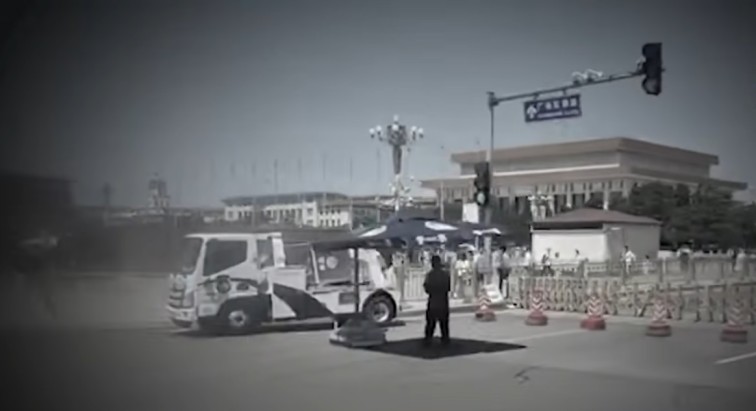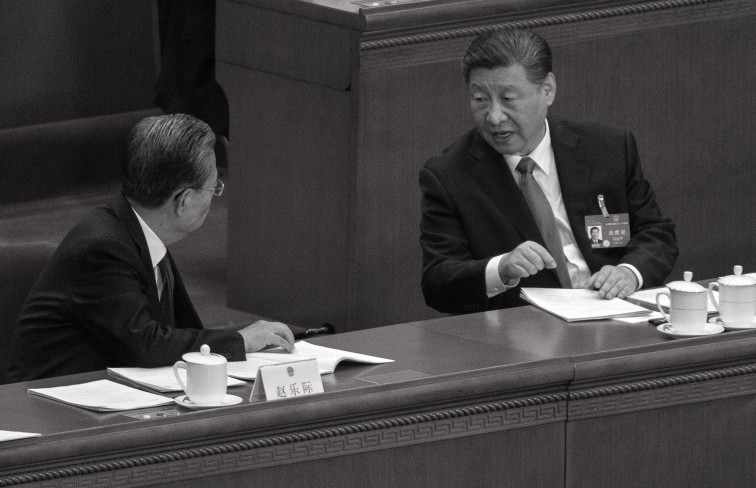Flag of Taiwan. (Annabelle Chih/Getty Images)
[People News] On the eve of Beijing’s September 3rd military parade, just 24 hours before the event, the regime was gripped by fear. Videos posted online showed that Chang’an Avenue was already under near-martial law: police and military personnel stationed every few steps, checkpoints everywhere, and a heavy concentration of armed forces and stability-maintenance vehicles along the streets and intersections. Tiananmen Square to the north and south had been sealed off, with not a pedestrian in sight.
One video posted by a netizen on the morning of September 2 showed temporary spectator seating being arranged beneath Tiananmen’s gate tower, decorated with bright flowers and flags. But these colors could not hide the tense unease of the armed presence. Another video from 3:28 p.m. the same day showed Chang’an Avenue eerily deserted under gloomy, oppressive skies. Normally teeming with cars and people, the street appeared like a ghost road—so silent it seemed to carry the stench of doomsday.
Inside subway cars, heavily armed police outnumbered the handful of passengers. Officers stood guard at underpasses and subway entrances. Buses carried in waves of plainclothes security forces, while groups of black-clad agents poured into the capital. Police and guard dogs filled the streets, treating ordinary citizens as enemies. It was an ironic contrast to the CCP’s propaganda of “the army and the people as close as fish and water.” Now, the fish were terrified of water itself.
Adding to the farce, CCP warplanes continued to harass Taiwan around the same time. With the 80th anniversary of the Sino-Japanese War being touted, the regime was desperate to posture as a heroic defender against Japan. Yet this time, its belligerence backfired spectacularly, turning into an international embarrassment.
On August 29, across the Taiwan Strait, warplanes from both sides engaged in not combat, but an exchange of words. In a scene as ironic as it was telling, Taiwan’s pilots delivered the PLA a lesson in democracy.
According to a video published by Taiwan’s Mirror News, on August 29 a PLA jet intruding into Taiwan’s air defense zone was intercepted by ROC fighters. During the standoff, a Taiwanese pilot broadcast over radio: “Why don’t you stand up before you speak? You’ve been kneeling your whole life, slaves of the Communist Party. You still don’t know how to stand up and resist the CCP—how pitiful!”
The PLA pilot, enraged, cursed back with vulgarities. Unfazed, the ROC pilot continued: “Pathetic! Truly pathetic! A lifetime on your knees. Don’t you even know what freedom is? Pitiful!”
The PLA pilot cursed again. The Taiwanese pilot pressed further: “Did you elect Xi Jinping? How pitiful!”
The PLA pilot fell silent and quickly withdrew.
The video went viral online, sparking heated discussion. Netizens praised it as “real cross-strait dialogue,” with comments such as:
-
“Which Taiwanese pilot was this? I salute you—courageous defender of Taiwan!”
-
“Respect to the ROC Air Force officers. Excellent work, keep going!”
-
“Thank you for protecting Taiwan, this land of freedom and democracy.”
That one question—“Did you elect Xi Jinping?”—struck the CCP’s most vulnerable nerve, hitting its weak spot. The PLA was left humiliated, exposing not its air superiority but a tragicomic performance in the skies over the Pacific.
The CCP’s grand parade was ostensibly about showing strength, but in truth it was an attempt to bolster its own shaken confidence. The regime’s apocalyptic fear spread faster than any virus. Across the country, mass crackdowns accompanied the preparations, throwing society into chaos. Netizens reported that when Kim Jong-un’s special train entered Beijing, roads along the route were sealed off, barring ordinary citizens from travel.
Petitioners from across China were especially targeted. Large numbers were detained at Jiujingzhuang, with local governments dispatching security agents to Beijing in swarms like locusts, preying on the vulnerable.
During such “sensitive times,” repression of religious believers and Falun Gong practitioners intensified. Videos showed police breaking into the homes of underground house-church members in Beijing to harass and threaten them. According to Minghui.org, Falun Gong practitioners nationwide were abducted by police from the notorious 610 Office in the run-up to the parade.
This so-called “prosperous era” revealed itself as a tale of two Chinas: on one side, extravagant parades, foreign delegations, and obscene displays of wealth; on the other, factory closures, mass layoffs, homelessness, and citizens dying in the streets.
Videos showed Hebei petitioners lining up endlessly to seek help from central inspection teams, while in Shanghai, food delivery workers sweated and cried under the blazing sun just to survive. These scenes of extreme hardship brutally tore apart the illusion of a “thriving China.”
In Guangdong, workers at China State Construction’s Fourth Engineering Bureau reported four months of unpaid wages. One worker, after failing to recover wages, committed suicide by jumping. The company absurdly labeled the workers’ appeals “malicious wage claims” and called in police for “stability maintenance.” Yet shortly after, it forced these same unpaid workers to watch the September 3 parade broadcast.
Meanwhile, across the nation, while countless workers went unpaid and families struggled to feed themselves, the Party ordered all state-owned enterprises, agencies, and institutions to watch the parade on September 3.
With the economy in freefall and livelihoods collapsing, the CCP’s nationalistic theatrics fooled no one. On September 1 in Beihai, Guangxi, a street vendor fearlessly took on over a dozen urban-management officers (chengguan). On August 29 in Chongqing, a man named Qi Hong staged a dramatic act of resistance by projecting anti-CCP slogans onto a giant university district screen, shocking the internet.
Beijing itself was not quiet either. Citizens scrawled anti-Party slogans on public restroom doors and walls, recording videos and uploading them online. On August 13, in a Beijing neighborhood, a hand-written dazibao appeared with the headline: “General Secretary Step Down,” signed by an “old worker,” directly calling out Xi Jinping.
Today, the CCP faces crises both domestic and international: an economy bleeding dry, political regression, forced parades to feign strength, treating citizens as enemies, and persecuting the innocent. Can such a regime escape divine retribution? How much longer can it survive?










News magazine bootstrap themes!
I like this themes, fast loading and look profesional
Thank you Carlos!
You're welcome!
Please support me with give positive rating!
Yes Sure!